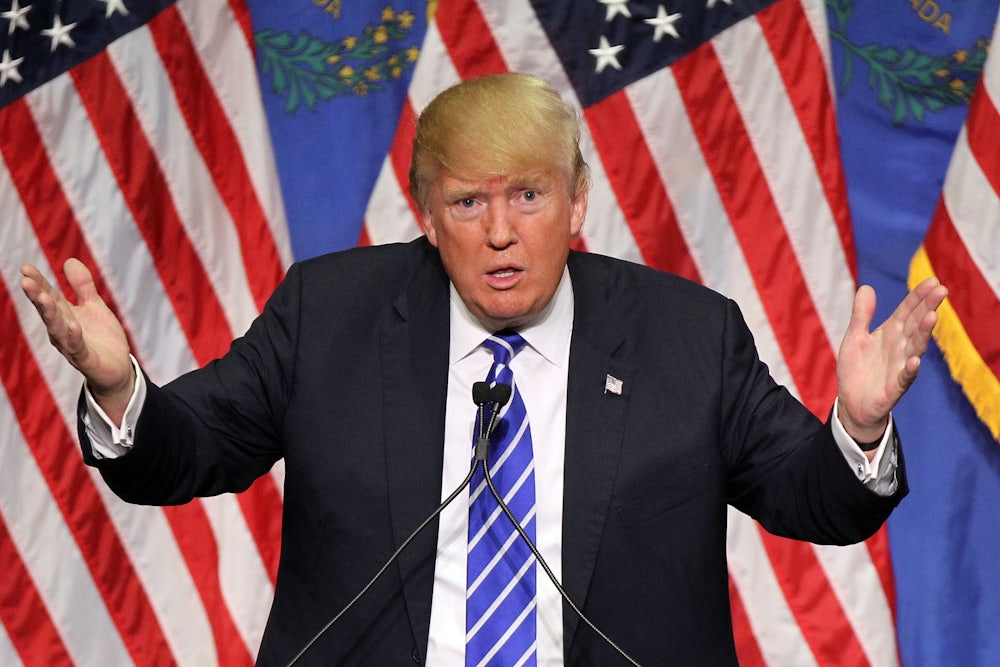If the #NeverTrump movement survives primary season and remains relevant during the general election, it will be thanks to a single animating insight—that winning a general election is actually much easier than winning a contested primary.
The fear that animates #NeverTrump conservatives, like the fear driving some liberal voters to vote for non-Trump Republicans in open primaries, is that as the Republican nominee, Donald Trump could become president of the United States almost by accident.
As the Washington Post’s Greg Sargent has noticed, it isn’t uncommon for commentators to note with great foreboding—after violent incidents in Paris, San Bernardino, and now Brussels—that with Trump as the GOP nominee, we’d be one terrorist attack away from a Trump presidency.
It is this general fear—not of a terrorist attack, per se, but of how such an attack could lead to Trump becoming president—that has divided the right between those who want to stop Trump from securing the nomination by any means necessary, those who want to create some kind of third-party option for anti-Trump conservatives, and those who hope Trump can be controlled.
After Tuesday’s primary elections, in which Trump secured another 58 delegates, and extended his lead over Ted Cruz by 18 delegates, the first option is all but foreclosed. On Wednesday, House Speaker Paul Ryan became the face of option three.
In what can only be interpreted as an implicit rebuke of Trump, Ryan issued a plea for civility and political high-mindedness, without reversing his repeated commitment to supporting Trump, and working with him, if he becomes the GOP nominee. If this primary has proven anything, though, it is that Trump has much more power to shape Republican leaders than the other way around. The American political upshot of the terrorist attack in Brussels was that Cruz matched Trump’s proposal to ban Muslim entry into the United States by calling on “law enforcement to patrol and secure Muslim neighborhoods before they become radicalized.”
Ryan’s effective support for Trump may simply stem from his partisan obligations, but it also reflects a degree of denial about the predicament confronting his party. It is Ryan’s hope that Trump and the GOP can, against all prevailing incentives, dispense with Trump-esque rhetoric, then return to the policy dogmas that have defined Ryan’s political career—deregulation, free trade, reducing taxes on the affluent, and devolving the welfare state. Ryan’s own professional setbacks reveal the folly of that hope. Before the 2012 election, when he was the Republican Party’s vice presidential nominee, Ryan spoke in apocalyptic, almost Trumpian terms about the state of the country. A key liberal critique of conservatism has long been that the movement’s substantive objectives lack majority support and must thus be fused with divisive rhetorical subtext and innuendo. That formula may no longer work, but simply slicing off the rhetorical half without any concomitant changes to the policy agenda would be genuinely suicidal. If anything, Trump has demonstrated that rhetoric is the most important half of the formula. If Republican leaders attempt to control Trump, instead of abandon him, something will give, but it will not be the things that drive Trump’s support. Ryan is thus as unlikely to convert Trump to Jack Kemp-style conservatism as he is to constrain him in the event of a domestic suicide bombing.
The only conservatives truly committed to preventing the scenario of a rogue Trump presidency are the ones plotting a third-party strategy.
The notion that a terrorist attack might sway a Hillary Clinton-Donald Trump election to Trump stems from two premises: first, that national security threats enhance the appeal of the Republican Party’s militarism; second, that negative, exogenous shocks, like terrorist attacks, drive voters into the arms of the non-incumbent party. As a reckless, unpopular, and divisive figure, Trump has essentially invalidated the first premise. Republicans still maintain a generic polling advantage over Democrats on domestic security questions, but Trump trails Clinton badly. If terrorism drives voters toward politicians they trust to improve security, then the issue plays to Clinton’s, not Trump’s, advantage.
The problem is that it may not matter who tops the Republican ticket, because the second premise remains valid. The 2008 economic crisis redounded to then-Senator Barack Obama’s benefit because he was identified as a challenger to the existing regime. The 2004 terrorist bombing in Madrid swung control of Spain from the incumbent conservative party to the contesting socialist party for the same reason. A similar exogenous shock would naturally benefit the GOP this fall no matter who topped the ticket.
One unknown variable in this formula is that past exogenous shocks served not just to harm incumbents, but to rally opposition parties. We don’t know what happens when the opposition is led by someone who lacks support from a significant faction of his own party. And this is where the immensity of the #NeverTrump burden comes into clear focus. If a similar shock were to hit our system later this year, in a head-to-head Clinton-Trump race, the anti-Trump right would have to turn a final corner and, in an ultimate indignity, become active Clinton supporters.
Committed #NeverTrump activists must realize there is effectively little difference between opposing Trump and supporting Clinton. But under normal circumstances, opposing Trump is as far as they’d ever need to go. In the event of a close contest, even one that narrows due to events outside either candidates’ control, they will need an outlet.
A third-party protest candidacy provides an escape hatch. Without that option, partisan instincts are much likelier to take over, and bring even the most committed #NeverTrump activists along for the ride.
To learn more about the 2016 elections, subscribe to our podcast Primary Concerns, hosted by Brian Beutler. You can listen to the latest episode here:
